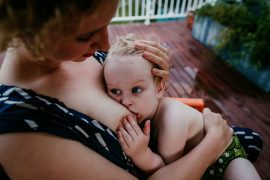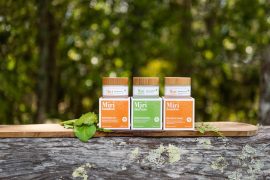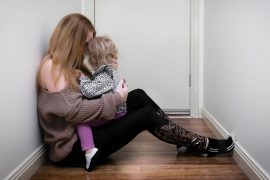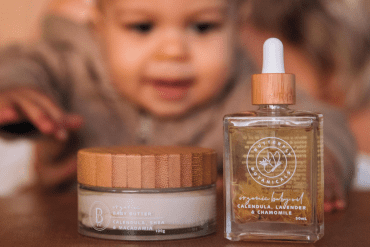“Being able to feel safe with other people is probably the most important aspect of mental health; safe connections are fundamental to meaningful and satisfying lives.”
Bessel van der Kolk pointed this out in his book “The Body Keeps the Score” and it seems so obvious: mothers and the primary caregivers around a child are the source of safety and security in the normal course of events. Anything that disrupts this is going to have a long lasting and negative impact.
If mothers are not well, if they are not supported, they and their children, and society will all suffer together.
For infants to thrive, mothers must thrive too
James Heckman points out that investing in early childhood development is well worth it, from both a sociological and economic perspective:
“The highest rate of return in early childhood development comes from investing as early as possible, from birth through age five, in disadvantaged families. Starting at age three or four is too little too late, as it fails to recognise that skills beget skills in a complementary and dynamic way. Efforts should focus on the first years for the greatest efficiency and effectiveness. The best investment is in quality early childhood development from birth to five for disadvantaged children and their families.”-James J. Heckman
When you combine not investing in perinatal mental health, and not investing in early childhood development, the long term cost to society is staggering.
This has to change.
So what can we do? How can we encourage healthy brain development for our children and ensure their mothers and other caregivers are given the support they need?
Ultimately, this needs change at the political and social level; a change in focus and a recognition that investment is worth it.
- Write to your MP, your local hospital, your local health visiting service, demanding better care for mothers and their babies.
- Talk to the parents and health professionals you meet.
- Encourage early years child care providers to offer trauma-informed care.
- Be more aware of the mothers and caregivers in your social circle: do they need support?
- Share information about perinatal and infant mental health widely.
- Be part of a paradigm shift that values infants and their mothers and carers fully.
Gentle and responsive parenting builds a happy brain, creating a healthy positive inner thought state that affects long-term mental health. Furthermore, building resilience by creating stable, reliable relationships helps to combat the effects of adversity that so many children experience.
Researchers such as Michael Meaney are further advancing our understanding of the influence of the social environment on genomic structure and function.
Be a responsive parent
When your baby cries, pick them up and comfort them, knowing that you are helping their brain to develop in positive lines. You’re building a secure foundation for them, helping them to build a sense of belonging and being valued.
Hold your baby; give them the gift of soft touch and cuddles
The close contact of soft touch (holding, stroking, massage, rocking) is an essential part of building a social brain and a secure attachment (that later encourages confident exploring). Our human instincts are strong (a baby’s cry tugs at our heartstrings and we feel the urge to gather them up, hold them close and rock gently while murmuring in a soothing way). We are discovering much of the neurochemical science behind this normal, natural behaviour: the chemistry of cuddles. Oxytocin release builds loving connection via multiple pathways. Soft touch has helpful effects on the hypothalamic-pituitary-axis and cortisol production, reducing pain and modulating the stress response via epigenetic changes (the work of Francis McGlone.)
Don’t be afraid to cuddle your baby often; you are helping to build a happy brain. Comments such as “put that baby down, you’re building a rod for your own back” are inaccurate and not based on any scientific evidence. Securely attached children with happy brains are worth building!
Try a baby carrier
A comfy baby carrier will give baby plenty of close contact and soft touch, in a safe space, building a secure attachment.
It recreates in some part the intra-uterine environment of warmth and safety and containment (the 4th trimester period) and allows babies to feel safe and secure.
From this place of confident trust, they can use their energy to develop new skills and engage with the world. You will have your hands free to live your life and do the things that you need to, for your own mental and physical health. Your local sling library can help you find one that fits you both, is safe, and is comfortable (no baby carrier should be uncomfortable; if it is, it doesn’t fit right). Read some more in depth discussions about the positive effects of babywearing here.
Talk to your baby, smile, laugh and play with them; engage in plenty of eye contact, and respond encouragingly to their attempts to communicate
This helps them learn about the world and their relationship with you. You’re helping them to build a sense that they are lovable and precious to you, providing them with an intrinsic motivation to keep going with developing their new skills.
Recognise your baby as a person with feelings and emotions; young infants do not have the cognitive skills to manipulate
Babies can become overtired and upset – this is due to their immature brains, not a rejection of you. Babies do not cry to be annoying, but to express their distress and ask for help. Parenting a tiny person can be hard work; don’t do it alone.
Look after your own mental health, and get some support
This is absolutely essential: your own health and wellness is key to being able to be a responsive parent. If you need a break for a few minutes, put your baby down somewhere safe and take the pressure off. Surround yourself with as much support as you can; and ask for it if it’s not obvious. Take the first step of talking to another parent; they may be feeling just the same as you and you can then encourage each other. Find encouraging communities, real ones if you can, online too.
Believe that you matter too: if you are a mother, if you are a father, if you are a caregiver. You are an essential part of the family unit and you will thrive best when you all try to work together
Your baby does not need a perfect parent or carer; your baby needs a loving, well-supported caregiver. It is a learning curve: a journey you travel together, mostly heading in the right direction. You don’t need to get it right all the time, your baby’s brain will not revert back to a jungle because you all have bad days.
Be gentle with yourself; you are learning too! You are learning how to be a parent or carer right alongside your baby.
Further reading:
Bruce Perry – The Boy Who Was Raised As A Dog
Bessel van Der Kolk – The Body Keeps the Score
Harvard Center on the Developing Child resources
The Unicef Relationship Building resources
The CDC Adverse Childhood Experiences study
Trauma Informed Approaches to Mental Health in the UK Maternal Depression Can Undermine the Development of Young Children
The Future of Healing: Shifting From Trauma Informed Care to Healing Centered Engagement
We need to talk about children’s mental health - Dr Elizabeth Gregory
International Forum for Wellbeing in Pregnancy website
Action Mental Health
Association for Infant Mental Health
Children’s Mental Health Week with the Place2Be
Babywearing for Foster and Adoptive Parents
Building Bonds Project – a group that recognises the importance of building early positive connections within families at times of disadvantage and crisis and donates slings and carriers.
Originally published here.
Rosie Knowles is a mum of two and a family doctor in the UK with a particular interest in holistic medicine as well as children and women’s health and mental health. She is a passionate advocate of building secure attachment relationships between children and their carers, due to the long lasting effects this has on future health. Her book, “Why Babywearing Matters“, was published by Pinter and Martin in May 2016 and she has written for a wide range of publications. She trains carrying advocates, peer supporters and health professionals. Visit her website Carrying Matters and follow her on Facebook, Instagram and Twitter.










